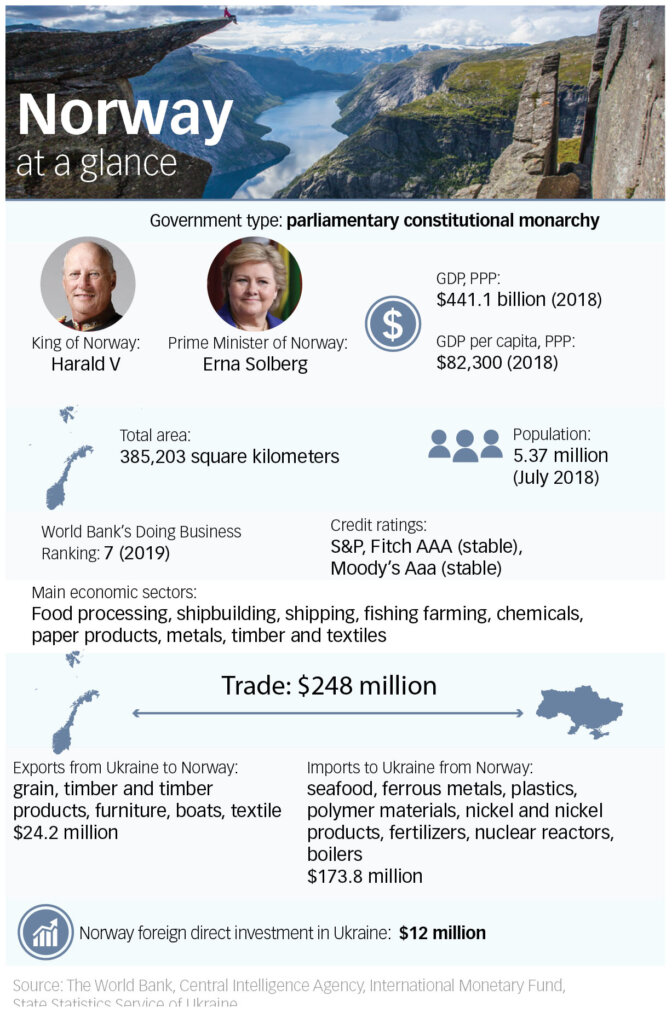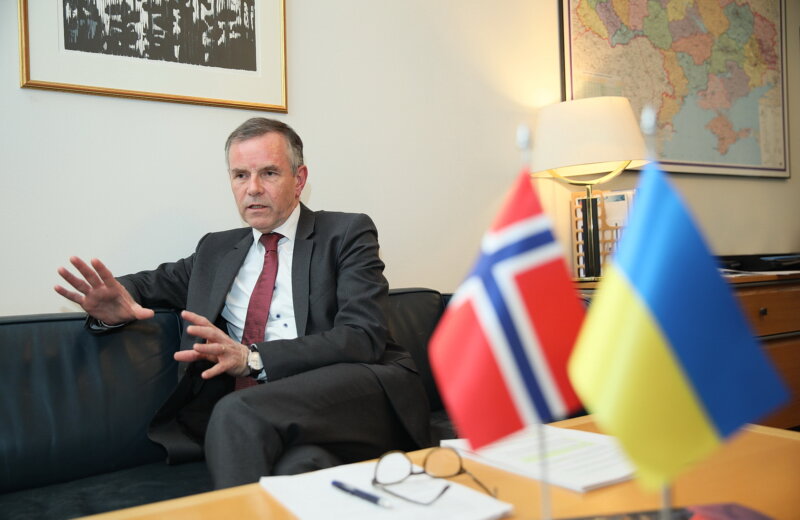This year will bring a sea change in the lineup of foreign diplomats stationed in Kyiv. Besides the recently departed ambassadors from Turkey and Japan, others reportedly slated for reassignment this year include the envoys from America, France, United Kingdom, and perhaps Switzerland, Sweden, Canada and more.
But Ole T. Horpestad, the ambassador from Norway who arrived on Sept. 1, 2016, expects to stay through the summer of 2020.
In his time in Kyiv, the Nordic country he represents continues to distinguish itself as one of Ukraine’s best allies, with a consistent aid package of at least $23 million annually that is set to go higher with more assistance in Ukraine’s energy sector.
The amount also includes an annual small-grants program of roughly $454,000 that focuses on projects in four areas: good governance/rule of law; human rights; free media and speech; and strengthening democracy. The competition is fierce, with only six projects getting funded in 2018 out of 160 applications.
Norwegian direct foreign investment is at least $12 million and climbing, fueled by renewable energy projects in solar (ScaTec), wind (NBT) and hydropower, thanks to Ukraine’s high “green tariffs,” which give investors a chance to become profitable more quickly.
About 60 Norwegian companies are doing business in Ukraine. Bilateral trade was estimated at $248 million in 2018, dominated by Norway’s seafood exports to Ukraine. Ukraine, in turn, sent agricultural products — including fish food — and consumer items such as Fischer skis, among other goods. Some 2,000 Ukrainians are employed in Norwegian information technology companies in Ukraine.
Additionally, Norway’s $1 trillion Government Pension Fund Global, one of the largest sovereign wealth funds in the world thanks to the nation’s abundance of oil, also has three equity investments — in Myronivskyi Khliboprodukt, Mriya Agroholding and Ovostar Union — in Ukraine worth $63.4 million as of Dec. 31, 2017. The fund is so large that its value amounts to $190,000 per Norwegian.
Jan. 28 Oslo conference
But the big news is yet to come.
Horpestad was interviewed on Jan. 21 in the Royal Norwegian Embassy in Kyiv as he geared up for the Norwegian-Ukrainian Business Forum in Oslo. More than 325 participants, almost evenly split from both nations, are expected to attend.
The event takes place on Jan. 28 and has top-level political participation. Norwegian Prime Minister Erna Solberg and Ukrainian Prime Minister Volodymyr Groysman will speak. Kyiv Mayor Vitali Klitschko will also take part.
At the conference, Horpestad said, his country will make a welcome announcement. “Norway has decided to step up substantially our energy cooperation with Ukraine this year in four areas,” he said. While the amount hasn’t been announced yet, the increase is expected to reach tens of millions of dollars over a period of years in four areas with the aim of helping Ukraine become more energy independent.
The four areas are:
1. An energy efficiency initiative in public buildings, including schools, city halls and hospitals, with the Nordic Environment Finance Corporation, or NEFCO.
2. Corporate governance reform of Naftogaz and other state-owned enterprises in conjunction with the Organization for Economic Cooperation and Development, or OECD.
3. Greater participation in the multi-donor account with the European Bank for Reconstruction and Development in financing energy sector reforms and the funding of such institutions as the Business Ombudsman.
4. Help with boosting Ukraine’s hydropower potential.
Building on past events
The Jan. 28 conference, organized by the 104-member Norwegian-Ukrainian Chamber of Commerce, continues a succession of events and visits that keep a bright glow over bilateral ties.
In 2015, Solberg came to a Kyiv business forum where she spoke with then-Prime Minister Arseniy Yatsenyuk. In 2016, Poroshenko appeared at an Oslo forum with Solberg. In 2018, yet another business conference took place in Kyiv, along with visits to Ukraine by Norway’s foreign minister, education minister and president of parliament.
Besides energy, Norwegian assistance is geared toward improving rule of law, helping Ukraine adapt to European trade standards, and humanitarian assistance.
NATO member Norway has never wavered in supporting Ukraine’s sovereignty and territorial integrity with economic sanctions against Russia, whose five-year-old war has dismembered Ukraine and killed 13,000 people so far.
“All in all, the visit to Oslo will be an important one on the backdrop of positive economic and political relations,” the ambassador said.
Ukrainian-speaking, well-traveled
On a personal level, Horpestad — the married father of one adult son — wins high marks with his ability to master Ukrainian (aided, he said, by his prior knowledge of Russian and Polish), since his arrival in 2016.
He has a love of sports and outdoors that comes through on his Facebook page. He is also noted for his calm temperament and his willingness to travel frequently to all corners of Ukraine, also chronicled in his Facebook posts.
The travels have given him insight about the state of infrastructure and the mood in the regions.
“I go by plane, train and car, depending on the destination,” Horpestad said. “My experience with the InterCity trains is good. They are comfortable and usually stick to the time schedule. When it comes to driving, I would say that the main roads connecting the bigger cities have improved a lot and are generally good. However, there is still a job to do to lift the standards of regional and local roads. Some of the regional airports are also in need of upgrading and modernization. Decentralization reforms are helpful, and a lot is happening now in the regions. Infrastructure development is essential for developing the economy and tourism across the country.”
Challenges remain
Norway will keep a close watch on Ukraine’s presidential and parliamentary elections this year with the expectation of free and fair contests.
Another challenge for Ukraine, Horpestad said, is to “create a predictable and stable” business climate that appeals to investors.
Specifically, he said, this “means fighting corruption, creating an independent and reliable court system that follows European and international standards. That is the basic issue that businesses point to when it comes to challenges and how to move the business climate forward.”
Norway also looks to “the creation of an independent and efficient anti-corruption court, hopefully now in June.” Ukraine has not prosecuted or convicted anyone for high-level corruption since its independence as a nation in 1991.
He said the creation of UkraineInvest to promote investment and the Ukrainian business ombudsman, to help investors resolve disputes, have been helpful. Norwegian investors report progress, he said, but also the need for Ukraine “to keep up the pace of the structural reforms, which are necessary to move Ukraine forward to the goal of European integration.”
2019 goals
There is still no direct Kyiv-Oslo flight, limiting potential growth in tourism between both nations. The most common options include layovers in Latvia, Poland, and Sweden.
This year, Norway opens up an honorary consulate in Odesa. The Ukrainian citizen will represent the Norwegian government in the southern oblasts of Odesa, Mykolaiv and Kherson, locations of key Norwegian businesses.
In February in Ivano-Frankivsk, a Norwegian film festival will be staged with possible stops around the country, especially Lviv, where the University of Lviv teaches the Norwegian language. Horpestad bestowed an honor on one of the university’s professors last year who translated 50 Norwegian-language books into the Ukrainian language.
Both nations are also exploring joint film projects with the historic Odesa Film Studio.
Norway will also continue its “Democracy in Schools” project in many schools nationwide, including three in Kyiv, with curriculum geared towards an appreciation of democratic values as well as help with teacher training.
Other programs also work with Ukraine’s probationary services to help ex-inmates reintegrate more successfully after serving prison sentences.




